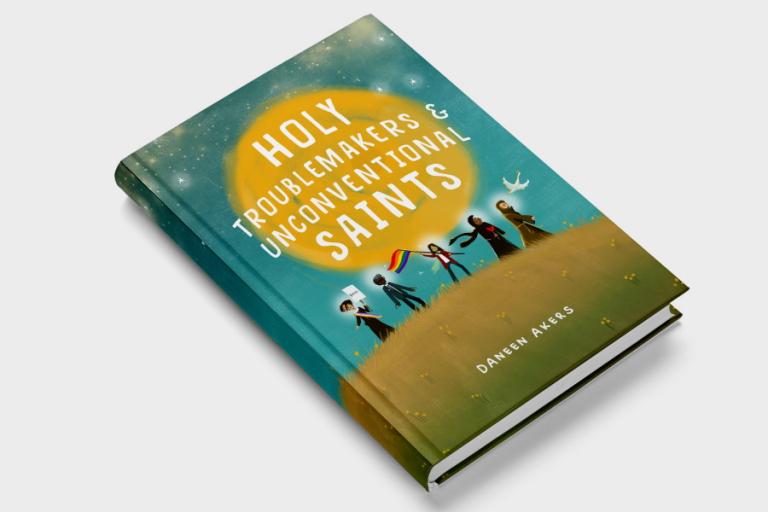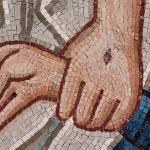
I chose not to vote in the 2016 United States presidential election. I was then (and still am) very much opposed to Donald Trump and to everything he represents, but for a number of reasons, I just didn’t feel right about casting a vote:
- Not a single candidate was free from violent policies that I oppose, so I didn’t feel I could endorse any of them.
- I wanted to avoid the temptation of putting my faith in politics to save the world, because I knew how easily it could become an idol.
- As one who considers himself first and foremost a citizen of God’s kingdom, I didn’t see it as my place to impose my beliefs on my resident country.
If you’ve read Greg Boyd’s The Myth of a Christian Nation: How the Quest for Political Power Is Destroying the Church or my friend Keith Giles’ Jesus Untangled: Crucifying Our Politics to Pledge Allegiance to the Lamb, you’ll have a better idea of where I’m coming from.
Now, here’s the thing—I still substantially agree with those reasons I gave. And I still agree with the bulk of what each of those books are getting at. I’d highly recommend reading them both if you have not already.
But somehow, Donald Trump actually got elected.
I never believed it could actually happen. And I certainly never imagined how bad it would actually be. But every day since that moment, I have seen the very real suffering he has caused.
Suddenly, my principled stand against participating in the system began to feel a bit selfish. In fact, it began to feel an awful lot like white male cis-hetero Christian privilege. Because—let’s be honest—so far, my own life has at best been inconvenienced by Trump.
It’s people of color, it’s women, it’s the LGBTQ community, it’s Muslims and those of other non-Christian religions—in other words, it’s all the oppressed and the marginalized whom I as a Christian am supposed to care most about—who are suffering most under Trump’s regime.
In principle, I still don’t believe in casting my own vote. But in practice, how can I not make such a simple gesture, when my opting out allows the perpetuation of so much evil? So do I take my principled stand? Or do I go against my principles on this matter for the higher principle of love?
- Yes, every single politician is corrupt in one way or another. No, I could never fully endorse any of them. But it’s undeniable that some of them would do less harm than others. And any of them would have done less harm than Trump.
- Yes, it would be wrong to put my faith in politics. No, I don’t believe politics will ultimately save the world. But legislating better policies will help ease pain and suffering for many people right here and now.
- And yes, I do consider myself first and foremost a citizen of God’s kingdom. No, I really don’t see it as my place to impose my beliefs on the country I happen to live in. But because I technically am an American citizen, if I can use my legal right to help others, then I should do so.
So that’s where I’ve been sitting. This is what I’ve been wrestling with.
An unlikely parable
In the middle of this wrestling, I came upon an insight from what I’ve long considered to be one of Jesus’ most confusing parables, commonly referred to as the “Unjust Steward” or the “Shrewd Manager.” Here it is from the NET Bible:
Jesus also said to the disciples, “There was a rich man who was informed of accusations that his manager was wasting his assets. So he called the manager in and said to him, ‘What is this I hear about you? Turn in the account of your administration, because you can no longer be my manager.’ Then the manager said to himself, ‘What should I do, since my master is taking my position away from me? I’m not strong enough to dig, and I’m too ashamed to beg. I know what to do so that when I am put out of management, people will welcome me into their homes.’ So he contacted his master’s debtors one by one. He asked the first, ‘How much do you owe my master?’ The man replied, ‘A hundred measures of olive oil.’ The manager said to him, ‘Take your bill, sit down quickly, and write fifty.’ Then he said to another, ‘And how much do you owe?’ The second man replied, ‘A hundred measures of wheat.’ The manager said to him, ‘Take your bill, and write eighty.’ The master commended the dishonest manager because he acted shrewdly. For the people of this world are more shrewd in dealing with their contemporaries than the people of light. And I tell you, make friends for yourselves by how you use worldly wealth, so that when it runs out you will be welcomed into the eternal homes.
“The one who is faithful in a very little is also faithful in much, and the one who is dishonest in a very little is also dishonest in much. If then you haven’t been trustworthy in handling worldly wealth, who will entrust you with the true riches? And if you haven’t been trustworthy with someone else’s property, who will give you your own? No servant can serve two masters, for either he will hate the one and love the other, or he will be devoted to the one and despise the other. You cannot serve God and money.” (Luke 16:1–13, NET)
On the surface of it, this parable seems to go against much of what we’d expect Jesus to teach. I mean, the manager is essentially stealing from his master. And stealing is wrong, right? And he seems to be relying on the use of his master’s money, even though Jesus wraps this up by saying you can’t serve God and money. Yet the master commends the manager for his shrewdness (or cleverness), and Jesus appears to do the same. What’s going on in this parable?
Here’s the best I can make of it:
- The manager’s actions were not exactly aboveboard, but because he he was his master’s representative, his actions were legally binding.
- His master commends him, not for the actions themselves, but for his cleverness.
- Jesus too commends him for his cleverness, and he frames it as being “trustworthy in handling worldly wealth” and being “trustworthy with someone else’s property.”
- So in what sense was the manager’s misappropriation of his master’s funds being trustworthy with his property? It was trustworthy, in this case, because the master was rich, because his debtors were poor, and because the manager’s actions helped to alleviate their suffering.
- The key then to being “trustworthy in handling worldly wealth” seems to be ensuring that it is distributed to those who need it most.
- Thus, in this context, serving money cannot be taken to mean relying on the use of money, for that’s exactly what the manager does. Serving God, in this case, is distributing that money from the rich for the good of the poor.
We could take an awful lot from this parable in terms of pure economics, and I think it would be wise for us to do so. But it struck me that this parable also parallels the cognitive dissonance I feel about voting:
- For myself, I can’t help but feel that my voting would not exactly be aboveboard, since I don’t consider myself a citizen of this country in any sense beyond legality. However, I technically am an American citizen, so I do legally have the right to vote.
- Given that the manager is commended for his cleverness, I should contemplate how I might most cleverly use my vote.
- As one who doesn’t identify with the nation I live in, I consider my vote, in essence, to be “someone else’s property.” So how might I use it in a trustworthy manner?
- Even if I don’t consider my vote to really be mine to give, I legally can give it, and doing so would help alleviate the suffering of others.
- The key then to my being trustworthy with politics is ensuring, as best as I can, that my vote helps those who need it most.
- Thus, if I am reading Jesus’ parable well, then I cannot be said to be serving two masters by engaging in politics. Rather, I am serving God by handling the “worldly wealth” of politics for the good of the oppressed and the marginalized.
All that to say, I’ve changed my mind about voting.
To the many who disagreed with me about my previous stance, I now believe that you were right, and I was wrong. I’m sorry for not voting against Donald Trump. Thankfully, I live in a state that overwhelmingly opposed Trump anyway, but still, if I could do it over again differently, I would.
And I will certainly be voting next time around.
















